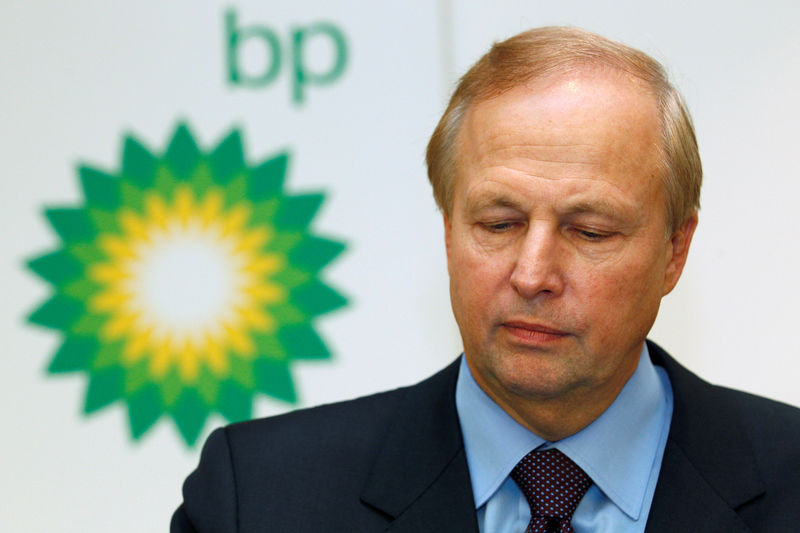By Ron Bousso and Karolin Schaps
LONDON (Reuters) - BP's (L:BP) shareholders have voted against Chief Executive Bob Dudley's £14.13 million ($20 million) pay deal for 2015, a rare investor revolt for such a major company, after it recorded a record annual loss.
Some 59 percent of shareholders on Thursday opposed the pay and benefits package, according to preliminary figures, in stark contrast with previous years when over 80 percent and sometimes as many as 90 percent voted in favour of the pay packages for senior executives.
Investors gathered at the ExCel exhibition centre in east London gasped when the initial voting figures were displayed on screen in the hall during the company's annual meeting.
BP's stock was down 1.3 percent at 1450 GMT, underperforming most rivals (SXEP) and the FTSE 100 index (FTSE) of leading British shares.
Dudley's 2015 pay and benefits rose 20 percent even though the company cut 5,000 jobs last year and reported steep losses after oil prices plunged.
While rival Royal Dutch Shell (L:RDSa) stayed in the black last year, its chief executive, Ben van Beurden, saw his pay fall to 5.6 million euros ($6.3 million) from 24.2 million euros.
Even though the vote was non-binding, BP executives said they would consider making changes to the way remuneration is calculated in future.
"We will ... review the overall remuneration package," Ann Dowling, head of BP's remuneration committee, told shareholders at the meeting.
"I will report on this next year with our conclusions and with a new proposed policy based on the outcome of this review."
The review will include assessing how the remuneration committee deals with oil price fluctuations and will engage directly with major shareholders.
BP had long argued that management rewards should be based on a combination of factors including cash generation and operational performance.
Last year Dudley clinched a final settlement with U.S. authorities over the 2010 Gulf of Mexico oil disaster, which many investors said removed uncertainty around the firm's future but also led to a big provision, pushing the company into the red.
UPRISING
Britain's biggest mutual life and pensions fund, Royal London Asset Management, and two shareholder advisers, Institutional Shareholder Services and Glass Lewis, had all recommended rejecting Dudley's pay.
"The 59.1 percent vote against the executive directors remuneration is extraordinary and shows a lack of discretion by BP's board," said Ashley Hamilton Claxton, corporate governance manager at Royal London.
Top 10 investor Legal & General Investment Management said it voted against the remuneration package as the company "should have used discretion to scale back bonus payments and long-term incentive awards to executive directors" during the year.
"We welcome the Chairman's speech to meet leading investors and we will continue to engage with BP to develop a policy better aligned to long term shareholder returns," LGIM said in a statement.
BP said last month that executive directors received no increase in base salary in 2015 and that the senior leadership would not see salary increases this year either.
However, Dudley's total pay was boosted by a payment to his U.S. pension scheme and deferred bonus payments.
The shareholder vote is rare but not unprecedented.
In 2012 a majority of shareholders at two British companies, WPP (L:WPP) and Aviva (L:AV), voted against proposed pay deals for executives in what the media become known as the "Shareholder Spring".
Aviva Chief Executive Andrew Moss left the insurer a few days later, but WPP's long-serving CEO Martin Sorrell is still at the helm of the advertising group.
In Germany Volkswagen's (DE:VOWG_p) top management board has agreed to cut executives' bonus payments by at least 30 percent, a source said this week, as the troubled carmaker struggles to resolve a dispute over management pay in the wake of the emissions scandal..
DIVIDEND
BP had earlier struck a cautious tone on dividend payments, one of the main attractions for investors in energy firms but harder to justify in an era of lower commodity prices.
BP told investors it aimed to maintain dividends but could review the payout policy if oil prices remained lower for longer.
BP, which had long said dividends were an absolute priority, said that although its goal was to maintain dividends, it "must" at the same time secure its future by investing wisely.
"Be assured that we keep this balance under regular review. Should the oil price remain lower, longer than expected, we will need to revisit our financial framework," BP Chairman Carl-Henric Svanberg said.

Last year Italy's ENI (MI:ENI) was the first major oil company to cut dividends. ($1 = 0.8866 euros)
(writing by Dmitry Zhdannikov; Editing by Keith Weir, Greg Mahlich)